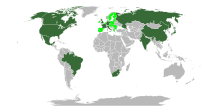The G8+5 group of leaders consists of the heads of government from the G8 nations (Canada, France, Germany, Italy, Japan, Russia, the United Kingdom and the United States), plus the leaders of the Outreach countries, five leading emerging economies (Brazil, China, India, Mexico and South Africa).
February 2007 Declaration
On February 16, 2007, at meeting of the G8+5 Climate Change Dialogue in Washington, D.C., a non-binding agreement was reached to cooperate on tackling global warming. The group accepted that the existence of man-made climate change was "beyond doubt", and that there should be a global system of emission caps and carbon emissions trading applying to both industrialized nations and developing countries. The group hopes that this will be in place by 2009, to supersede the Kyoto Protocol, the first phase of which expires in 2012.
Foundation
The G8+5 group was formed in 2005 when Tony Blair, Prime Minister of the United Kingdom, in his role as host of the 31st G8 summit at Gleneagles, Scotland, invited the leading emerging countries to join the talks. The hope was that this would form a stronger and more representative group that would inject fresh impetus into the trade talks at Doha, and the need to achieve a deeper cooperation on climate change.
Following the meeting, the countries issued a joint statement looking to build a "new paradigm for international cooperation" in the future.
The G8+5 Climate Change Dialogue was launched on February 24, 2006, by the Global Legislators Organisation for a Balanced Environment (GLOBE)[3] in partnership with the Com+ alliance of communicators for sustainable development.
Institutionalization
Following the 33rd G8 summit Heiligendamm 2007, the chancellor Angela Merkel announced the establishment of the "Heiligendamm Process" through which the full institutionalization of the permanent dialogue between the G8 countries and the 5 greatest emerging economies will be implemented. This will include the establishment of a common G8+5 secretariat at the OECD.
This process puts an end to the enlargement debate of the G8 into a hypothetical G9, G13, etc. since Merkel declared "The objective is the cohesion of all these countries into a single group which will be called G8+5".
33rd G8 summit
On June 7, 2007, leaders at the 33rd G8 summit issued a non-binding communiqué announcing that the G8 nations would 'aim to at least halve global CO2 emissions by 2050'. The details enabling this to be achieved would be negotiated by environment ministers within the United Nations Framework Convention on Climate Change in a process that would also include the major emerging economies. Groups of countries would also be able to reach additional agreements on achieving the goal outside and in parallel with the United Nations process.[4] The G8 also announced their desire to use the proceeds from the auction of emission rights and other financial tools to support climate protection projects in developing countries.[4]
The agreement was welcomed by British Prime Minister Tony Blair as 'a major, major step forward'.[5] French president Nicolas Sarkozy would have preferred a binding figure for emissions reduction to have been set.[6] This was apparently blocked by U.S. President George W. Bush until the other major greenhouse gas emitting countries, like India and China, make similar commitments.
2007 UN General Assembly plenary debate
As part of the schedule leading up to the September UN High-Level-Event, on July 31 the United Nations General Assembly opened its first-ever plenary session devoted exclusively to climate change, which also included prominent scientists and business leaders.[9] The debate, at which nearly 100 nations spoke, was scheduled to last two days but was extended for a further day to allow a greater number of 'worried nations' to describe their climate-related problems.[10]
In his opening speech, Secretary-General Ban Ki-moon urged Member States to work together, stating that the time had come for 'decisive action on a global scale', and called for a 'comprehensive agreement under the United Nations Framework Convention on Climate Change process that tackles climate change on all fronts, including adaptation, mitigation, clean technologies, deforestation and resource mobilization'.[11] In closing the conference General Assembly President Haya Rashed Al-Khalifa called for an 'equitable, fair and ambitious global deal to match the scale of the challenges ahead'.[10] She had earlier stressed the urgency of the situation, stating that 'the longer we wait, the more expensive this will be'.[11]
The day after the session ended, the UN launched its new climate change web site detailing its activities relating to global warming
September 2007 Washington conference
It emerged on August 3, 2007, that representatives of the the United Nations, major industrialized and developing countries are being invited by George Bush to a conference in Washington on September 27 and 28.[16][17] Countries invited are believed to include the members of the G8+5 (Canada, France, Germany, Italy, Japan, Russia, United Kingdom, United States, Brazil, China, India, Mexico and South Africa), together with South Korea, Mexico, Australia, Indonesia and South Africa. The meeting is to be hosed by US Secretary of State Condoleezza Rice, and is envisaged as the first of several extending into 2008. Initial reaction to the news of the conference invitation was mixed











No comments:
Post a Comment